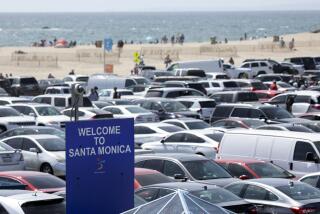Parking Permit Pros and Cons
The uproar at the public hearing on the overnight parking fee proposal (Glendale Edition, Aug. 24) should not be allowed to obscure the real issues involved. Whether the city of Glendale is to blame for letting so-called greedy landlords and developers into the city is irrelevant. Glendale has changed, and we must now deal with that change. Edward F. True’s assertion that the streets in each neighborhood belong to the people who live there is just plain wrong. Public streets are correctly named. They belong to everyone, and the needs of residents to use them must be balanced against the needs of everyone else, whether they are from south Glendale or Maine.
The basic idea of overnight parking fees is a good response to an increasingly serious dilemma. The parking problem in Glendale seems similar to that which developed in many areas in Southern California; suburbs transformed into cities while residents retained use of the automobile for all transportation needs. In some neighborhoods in Glendale, it is sometimes impossible to find a place to park. People who pay for off-street parking relieve some of that burden. People who use city streets for free overnight parking increase the problem. Overnight parking fees simply require car owners to pay for the increased economic costs that they place on the street system.
There are inequities built into the proposal. However, changing details of the plan to address these problems directly is preferable to junking the plan and is certainly better than doing nothing about the shortage of on-street parking. The city proposal should be amended to include the entire city. Every neighborhood would benefit in terms of aesthetics and crime reduction from fewer cars being parked on the streets; more revenue would be brought into the program, and the whole city would become involved in reducing the parking problem. Permit costs could be waived for those who must have a car, do not have off-street parking available and cannot afford the fees.
The economic development in Glendale has placed an increased burden on a street system designed to accommodate a low-density suburb, and the main question must remain how to deal with the serious shortage of on-street parking, crime and the worsening appearance of our city--not a blind denial of changes that have already taken place.
MARK BRIMMER, Glendale
More to Read
Sign up for Essential California
The most important California stories and recommendations in your inbox every morning.
You may occasionally receive promotional content from the Los Angeles Times.










